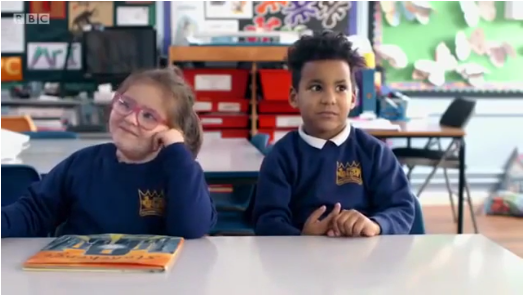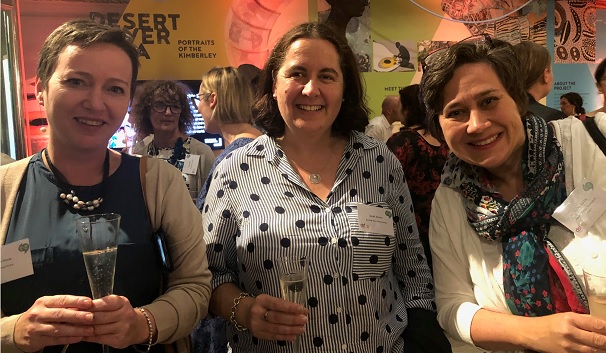Benchmark Assessment: often wrong
0 RepliesIt’s the end of the school year in Australia, so children are getting their end-of-year reports.
Many Australian schools use the American Fountas and Pinnell Benchmark Assessment System (BAS) to evaluate reading skills, but a new American Public Media (APM) report says it fails to identify most struggling readers.
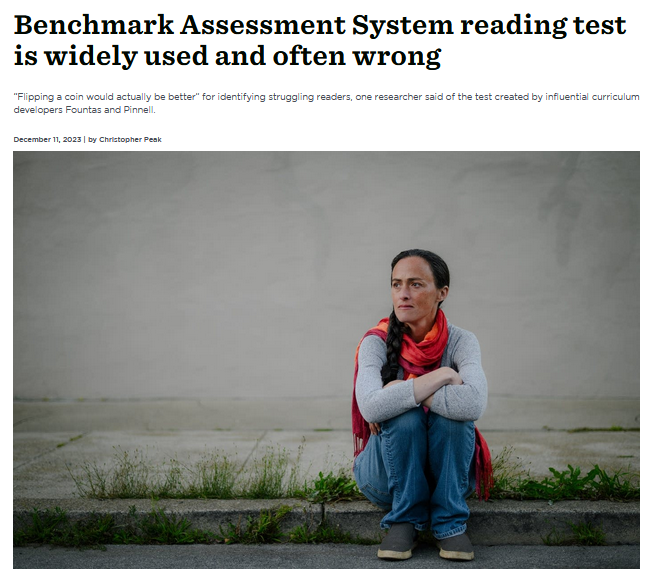
If teachers rely on the BAS results, they will be advising many parents not to worry about their children’s reading skills, though there’s good reason to be concerned.
If you’re in this situation, please seek more reliable and valid assessment. Early intervention is highly effective, and ‘late bloomers’ are more likely to wilt and suffer than catch up.
There are plenty of more cost-effective, efficient, reliable, valid literacy skill assessments available for school use. The excellent, Australian Reading Science in Schools website has an assessment list you can download here. Chances are that teachers using the BAS don’t know about researchers’ adverse findings on it, or good alternatives. Do them a favour, send them the APM report and RSS assessment list.
If your school can’t provide valid, reliable reading/spelling assessment, try asking local Speech Pathologists, Educational and Developmental Psychologists or Specialist Educators for a second opinion. Very young kids can do quite a lot of learning in the summer holidays with good professional guidance and/or by attending programs like our holiday groups. The sooner they catch up with peers, the happier they’ll be in 2024.
Summer holiday groups at Spelfabet
0 Replies
Bookings are now open for our intensive explicit, systematic synthetic phonics therapy groups in the week of 15-19 January 2024.
These are for young children (in school Years F-2 in 2023) who need extra help with learning to read and spell words by sounding them out.
Each group will run for an hour a day, and include plenty of games and fun. We will provide daily homework to complete and bring to the next session.
The groups will be:
| Time | Skill level | Example words targeted |
| 8.45am to 9.45am | Beginners: VC and CVC words. | at, in, hop, bus, red, fan, big |
| 10.15am-11.15am | Adding common suffixes to base words, doubling final consonants as needed. Introducing three “long” vowels with consonant-e/split/silent final e spellings, and when to drop final e before adding a suffix. NB if you have a Year 3-4 child who needs this level of work, we may run a second group for them at 11.45am. | bat-batting, swim-swimmer, hop-hopped, run-runny, shade-shady, time, timer, hope, hoping |
| 11.45am to 12.45pm | Adjacent consonants: CVCC, CCVC, CCVCC, CCCVC, CVCCC. | help, list, trap, stop, crust, strip, jumps |
| 2.00pm to 3.00pm | Consonant digraphs. | wish, chat, fetch, this, when, quick, sing |
We will provide all the necessary resources, including specialist take-home readers. We have a maximum of four children per speech pathologist in our groups, to keep the pace/intensity high. We match children carefully and ask that everyone comes prepared to attend all sessions and do all the homework.
Our groups will be held at our North Fitzroy office in Melbourne’s inner north, with attendance by appointment only. Spaces are limited, and upfront payment for all group sessions is required to secure a child’s place. The cost of a week’s program is $720, which covers all sessions, materials and planning time, plus a brief final report with recommendations. Missed sessions are non-refundable. Private health rebates may apply, depending on your level/type of cover, but Medicare only provides rebates for individual therapy sessions.
Children not already known to us need to attend an assessment session with us before joining a group. This allows us to check whether we have a suitable group, and helps us cater for any special needs/interests. If we don’t have a group matching a child’s skills and needs, we can usually suggest other intervention options.
Please contact Tiana Knights on admin@spelfabet.com.au, (03) 8528 0138 or text 0434 902 249 if you’d like to find out more about these groups, or book an assessment for a struggling reader/speller.
Therapists’ duty of care means we must recommend evidence-based teaching
0 RepliesA local school leader recently contacted me ask that my colleagues and I delete one of the recommendations we often put in assessment reports, because it is prompting parents to question the school’s teaching approach.
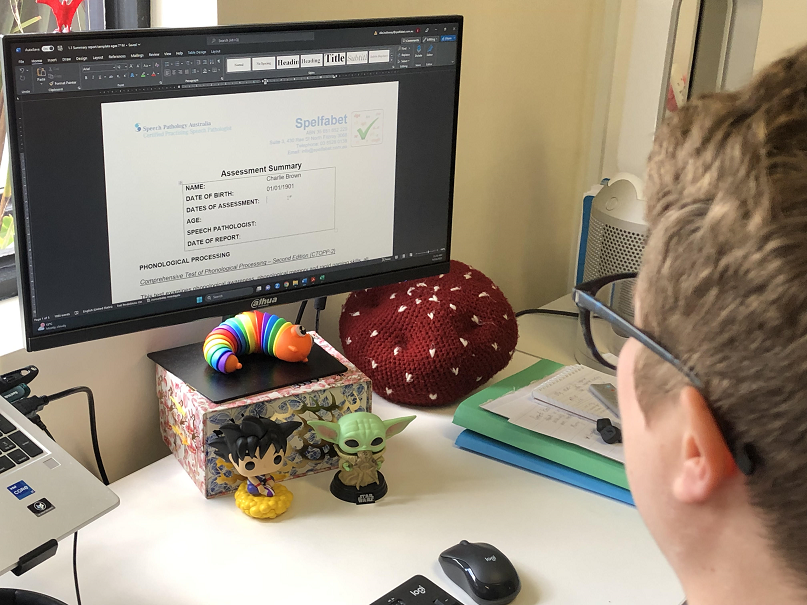
The recommendation reads:
(Child name) should not be taught using a ‘whole language’ or ‘balanced literacy’ approach (Reading Recovery, Leveled Literacy Intervention, Guided Reading, PM Readers, Running Records, etc.) as this approach does not control adequately for word structure and phoneme-grapheme correspondences, and encourages the strategies of weak readers, such as guessing and rote-memorising words. This approach is not explicit or systematic enough in its teaching of sound-spelling relationships or word structure.
The school leader explained that her school system requires staff to use approaches we recommend against, so our reports were putting their Reading Recovery teachers and other staff in a difficult position.
We have no desire to put anyone in a difficult position, but our duty of care is to our clients. We must make recommendations which are in their best interests, based on the best available scientific evidence.
It’s completely unfair to a child to have one set of adults teaching them to sound words out, and another set of adults teaching them to memorise and guess words. Memorising and guessing words are the habits of weak readers, but are encouraged when high-frequency word lists are used as spelling lists, and children are given predictable/repetitive texts containing spelling patterns they’ve never been taught.
Undoing bad habits and building strong foundational skills is hard work, especially when we only see clients for 40 minutes once a week or fortnight. They’re at school five days per week. It would be professionally irresponsible not to tackle this issue in our reports.
I agreed to send the school leader evidence supporting our recommendation, but this is the second request of this type, so it probably won’t be the last. Answering the question in this blog post, and linking to it in our reports, should help parents argue kindly and clearly for science, and help school leaders learn about reading research, and discard programs and practices that don’t help children thrive.
Reading Recovery
- May et al (2023) Long-Term Impacts of Reading Recovery through 3rd and 4th Grade: A Regression Discontinuity Study found that Reading Recovery had a long-term a negative impact on children. There is also a plain-English article explaining this research here.
- The Centre for Educational Statistics and Evaluation’s (2015) Reading Recovery: A Sector-Wide Analysis showed children in Reading Recovery made modest, short-term improvements which weren’t maintained over time.
- The Pedagogy Non Grata website’s analysis of Reading Recovery is here.
- Five From Five (2019) Reading Recovery: A failed investment explains that Reading Recovery is a weak intervention because it fails to sufficiently target phonemic awareness and phonics.
Leveled Literacy Intervention (LLI)
- Research its authors call the independent, gold standard evidence for LLI received funding from the program’s publisher, and was published on a university website, not in a peer-reviewed journal. The valid, reliable, objective measure of progress used in this research – DIBELS – showed that LLI was not effective. Children only improved on the subjective, LLI-devised measure. Here’s a video explanation.
- Pedagogy Non Grata’s Effect-Size-based meta-analysis of LLI research is here, which concludes, “The program is not research based”. The author discusses this analysis in this video.
Fountas and Pinnell Classroom
- The Pedagogy Non Grata website’s analysis of F&P Classroom research is here, which concludes, “The mean effect size found was negligible”.
- Ed Reports’ 2020 evaluation of Fountas and Pinnell Classroom is here.
Other balanced literacy strategies/resources
- The Pedagogy Non Grata website’s analysis of Lucy Caulkins’ Units of Study is here.
- Pedagogy Non Grata found no peer reviewed research on balanced literacy.
- Prof Pamela Snow’s 2017 blog Balanced Literacy: An instructional bricolage that is neither fish nor fowl, says balanced literacy is poorly defined, and in practice means eclectic teaching.
- US Reading Panel expert Timothy Shanahan rejects Instructional Level Theory here. Edublogger Karen Vaites expands on this and provides research links here.
- The Five from Five website explains that levelled reading schemes’ books for beginners encourage word memorisation and guessing, the habits of poor readers, as they contain many words beginners can’t yet decode, e.g. this example from the PM Readers.
- The US Reading League has a Three Cueing Systems and Related Myths video lecture online.
- Articles by Dr Kerry Hempenstall about three-cueing/multicueing are here and here.
- A/Prof Dennis S Davis et al’s 2020 ITE-insider perspective on cueing systems called Is It Time for a Hard Conversation about Cueing Systems and Word Reading in Teacher Education? argues it’s time for educators to stop using cueing. Yes, please.
Science of Reading
- American Public Media journalist Emily Hanford’s* six years of reporting on this issue, including her podcast Sold a Story, can be found here. Recently interviewed in New Zealand, home of Reading Recovery (now rapidly being replaced by Better Start and other programs), Hanford said this:
- The Australian Education Resource Organisation website has an Introduction to the Science of Reading.
- Pedagogy Non Grata has done a meta-analysis of research on the science of reading and writing instruction, and has an easy-to-understand beginner’s guide to reading research.
- Prof Pamela Snow’s SOLAR: Science of Language and Reading article summarises the process of learning language and reading, and has a very useful reference list.
- US Edweek’s How Do Kids Learn to Read? What the Science Says video is a plain-English summary.
- Profs Castles, Rastle and Nation et al’s (2018) article Ending the Reading Wars: Reading Acquisition From Novice to Expert is another useful overview.
- Prof Stanislas Dehaene’s Reading in the Brain is a classic text, and his key ideas relevant to effective instruction from a 2023 talk are summarised here.
Switching to evidence-based teaching
- Prof Pam Snow wrote Leaving the Balanced Literacy habit behind: A theory of change in 2020.
- Pedagogy Non Grata has an article about the impact of the many US state laws targeting literacy here, and the author is interviewed about it here. Research shows 97.5% of children can be taught to read at grade level with the right core instruction, and intensity and type of intervention.
- US Teacher Crystal Lenhart wrote a great letter explaining to parents why her school made the switch away from Fountas and Pinnell reading levels, leveled readers, Guided Reading and three-cueing, towards science-based literacy teaching, which many other schools have used as a template. You can hear her discussing her school’s experience and her letter in episode 161 of the Melissa and Lori Love Literacy podcast, or watch it on YouTube.
- There’s now a massive teacher-led movement for evidence-based teaching in Australia – see Reading Science In Schools, Think Forward Educators and Sharing Best Practice. There is lots of useful information on the Literacy Hub, Five From Five, ULD for Parents and AUSPELD websites.
I hope leaders of Australian schools still using balanced literacy (an ill-defined mishmash of things that work, and things that don’t, some of which can be harmful) find the knowledge, resources and inspiration to switch to science based teaching of reading and spelling in 2024.
* No, Emily Hanford and Pedagogy Non Grata’s Nathaniel Hansford (who writes/speaks as Nate Joseph) are not related.
New word-building videos
0 RepliesI’ve made three very short videos (each under 90 seconds) showing how lots of long words are built by adding prefixes and suffixes to base words. The tiles depicted are from the Spelfabet Moveable Alphabet and Affixes, many of which flip over, making it easy to demonstrate juncture changes e.g. how ‘y’ changes to ‘i’ in ‘funny-funnier’, and final consonants double in ‘run-running’ and ‘hop-hopping’.
The aim is to minimise wordy explanation, and maximise demonstration, so I’ll stop explaining them now, and let them speak for themselves. Hope you like them.
Embedded Picture Mnemonic bookmarks and desk mats
0 RepliesHelp beginners link speech sounds and letters/spellings with our new, printable embedded picture mnemonic bookmarks and desk mats.
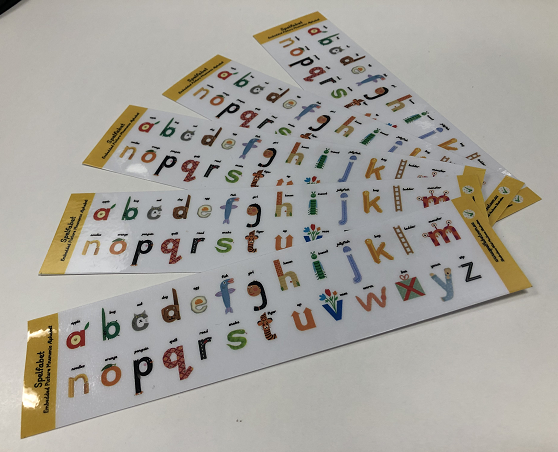
The bookmarks are single-sided, with one mnemonic for each letter of the alphabet. Five print to an A4 page. Save, print, laminate and cut up for distribution to literacy beginners. If/when some are lost/damaged, just print extras.
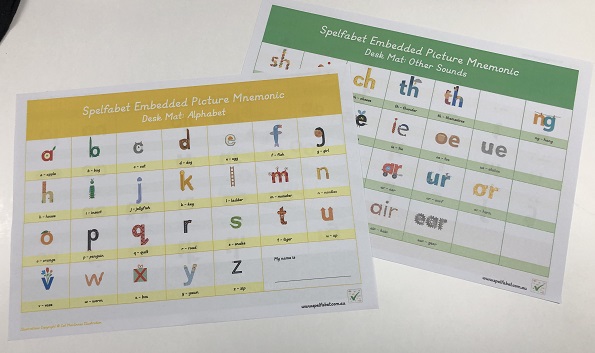
The desk mats have the alphabet on one side, and a mnemonic for each of the other sounds on the flip side. Print just the first side for beginners, or both sides to show learners that there are more sounds than letters, so many are written with letter combinations.
There are three versions, to suit different accents and preferences, all with the new y/yawn mnemonic:
- A version for most Australian, UK, NZ and other speakers of non-rhotic Englishes, with e/egg, k/key, o/orange, u/up, ur/surf, air/hair and ear/gears.
- A more Aussie version as above, but with k/kangaroo and u/undies (yes! back by popular demand).
- A version for US, Canadian and other speakers of rhotic accents, with e/echo, k/key, o/octopus, u/up, wh/whale, ur/burn, and aw/claw, but no air/hair or ear/gears.
Prices assume each purchaser will print enough for their class/caseload.
We hope you like them!
The Language, Learning and Literacy conference – Kathy Rastle
6 RepliesKathy Rastle was another keynote speaker at last week’s great Language, Literacy and Learning conference whose topic is directly relevant to this blog.
You might remember her as a co-author of last year’s influential paper about Ending the Reading Wars, and of this related article (both highly recommended reading).
Hers was the final keynote of the conference, but I met her on the first day. Being a dairy farmer’s daughter who went to Warrnambool High School, I’m still always a little amazed when people with titles like Professor and Head of the Department of Psychology at Royal Holloway, University of London say “hi, I’m Kathy”, and are utterly smiley, nice, and not the least bit pretentious.
Here Kathy is (on the right) with the also-legendary and lovely Lyn Stone (on the left) and Sarah Awesome (AKA Asome) of Bentleigh West PS, (check out their NAPLAN Year 3 spelling gain here!) at the conference Sundowner drinks. However, in the interests of showing proper, gender-neutral academic respect I’ll use her surname from now on.
THIS is a BORING book!
13 Replies
I’ve just watched a great 2016 BBC4 documentary called “B is for book”. It follows a group of London children from their first day at school for a year, and explores how they learn to read.
The kids live on a public housing estate in Hackney, and most speak languages other than English at home.
The film is not currently on the BBC website, but a few people have put it on YouTube. The version I watched is here, and you might like to keep it open in a new tab while you read, so you can quickly find and watch the interesting bits I describe below.
You’ll love all the children, but I was most entranced by a little boy called Stephan. An honest child with a low tolerance for Educrap, he looks and behaves a lot like a little boy I worked with last year, also a twin from public housing inclined to slide under the table.
At 19:42 on the video clock, the two children having the most difficulty learning to read in the film, Maria and Stephan, are asked, “What’s the hardest word you know how to spell?” First, they do this:
